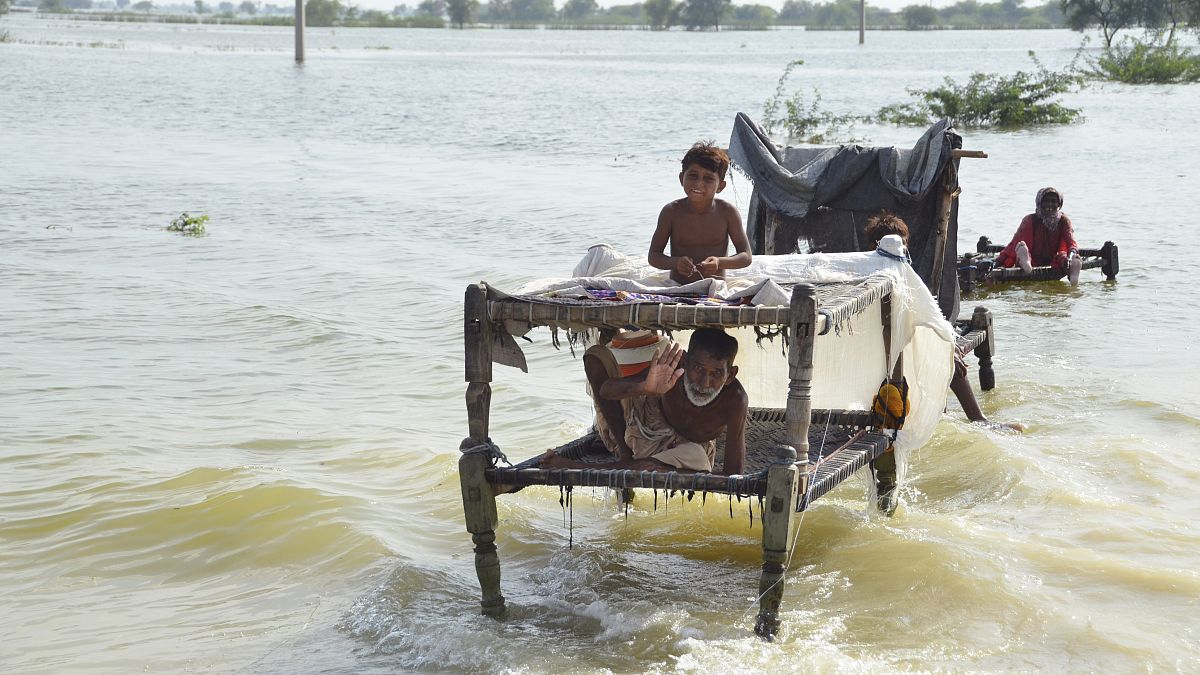Pakistan appealed to the international community on Saturday for an “immense humanitarian response”, after catastrophic flooding which has affected 33 million people.
Pakistan appealed for an "immense humanitarian response" from the international community on Saturday, after devastating flooding which has affected 33 million people and left more than a thousand dead.
Pakistan's Federal Planning Minister Ahsan Iqbal said the number of fatalities and people facing homelessness was continuing to rise due to the floods, triggered by abnormal monsoon rains.
According to initial government estimates, the rain and flooding have caused €10 billion in damages.
“The scale of devastation is massive and requires an immense humanitarian response for 33 million people. For this I appeal to my fellow Pakistanis, Pakistan expatriates and the international community to help Pakistan in this hour of need,” he said at a news conference.
Multiple officials and experts have blamed the catastrophic rain and flooding on climate change, including UN Secretary-General Antonio Guterres, who earlier this week said the world was “sleepwalking” through the deadly crisis.
Guterres will visit Pakistan on 9 September to tour flood-hit areas and meet with officials.
Earlier this week, the UN and Pakistan jointly issued an appeal for €160 million in emergency funding to help the millions of people affected by the floods, which have damaged more than 1 million homes.
Up to a third of Pakistan was estimated to be underwater in the immediate aftermath of the floods, although water has now receded.
Pakistan's National Disaster Management Authority in its latest report on Saturday counted 57 more deaths from flood-affected areas, which now sits at 1,265.
This figure is likely to grow even higher as more bodies are discovered and water-borne diseases potentially begin to spread.
Prime Minister Shahbaz Sharif's initial appeal for aid received a quick response from the international community, which sent planes loaded with relief goods.
A French aircraft carrying aid landed in Islamabad on Saturday and was received by Minister for National Health Services Abdul Qadir Patel.
That French plane's arrival followed the ninth flight from the United Arab Emirates and another from Uzbekistan.
Patel said the humanitarian assistance sent by France included medicine and large dewatering pumps to reduce water levels. He said France has also sent a team of doctors and experts.
Abnormally high levels of rain this monsoon season battered much of the Baluchistan and Sindh provinces as well as parts of Khyber Pakhtunkhwa, Punjab and the Gilgit-Baltistan territory.
The torrential rains and ensuing flash floods caused massive damage to infrastructure, roads, electricity and communications networks.
Ministers have said the government is working to bring normalcy back to the country as soon as possible but that the Pakistani government cannot do it alone.
Military spokesman Iftikhar Babar said rescuers, supported by the military, were continuing rescue and relief operations. He said army aviation, air force and navy troops were using boats and helicopters to evacuate people from remote regions and to deliver aid.
Babar said the army has established 147 relief camps sheltering and feeding more than 50,000 displaced people, while 250 medical camps have provided help to 83,000 people so far.
Health officials have expressed concern about the spread of waterborne diseases among the homeless people living in relief camps and in tents alongside roads.
Akhtar Nawaz, head of the disaster management authority, said parts of Pakistan that were expected to receive 15% to 20% additional rain this year actually received in excess of 400% more.
The country has seen 190% more rain this monsoon season.
UN agencies are stepping up their support of Pakistan's relief efforts. The floods are the deadliest in over a decade and more heavy rains are forecast.
The expanded assistance provided by the World Food Programme (WFP) and its humanitarian partners to flood-affected families will include food relief, malnutrition prevention and livelihood support.
In the last week of August, the WFP distributed food baskets to flood-affected families in Killa Bato, Nushki in the province of Balochistan.
A total of 400 households (2,600 people) were provided with food baskets containing a bag of 44KG of wheat flour, 4.5 KG of yellow split peas and a packet of 200 grams of salt.
According to the UN's children's fund, more than three million children are in need of humanitarian assistance.
UNICEF says it is working with the government and non-government partners to respond to the urgent needs of children and families in affected areas.
